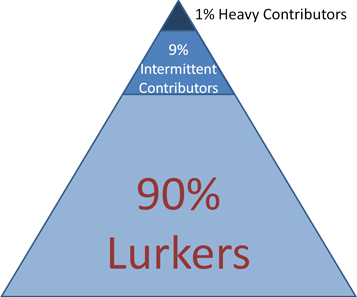 I read this study recently, about the inequality of online contributions. You should go read it as well, and then come back here. It’s easy to digest, and a quick read. You can even just skim it.
I read this study recently, about the inequality of online contributions. You should go read it as well, and then come back here. It’s easy to digest, and a quick read. You can even just skim it.
The first step to dealing with participation inequality is to recognize that it will always be with us. It’s existed in every online community and multi-user service that has ever been studied.
I wonder if there are studies on off-line communities, and if they show a similar trend. If you know of any, please post to comments.
Imagine if we could push people up this pyramid. What an incredible world we would live in, were more people to be creators, or at least to actively contribute in some way! Or at the least, we would be less fucked. I sincerely believe many of the problems facing humanity could be addressed if more people took an active role in their lives. Blame my socialist upbringing if you like. It’s why I worked (and continue to work) so hard at Jigsaw – creating an entry-level environment for n00bs to get their hands around a soldering iron before facing what can be rather intimidating robotics and the like. I gave a talk at Berlin-Sides in 2010 about hackerspaces being extroverted, and how it was an absolute necessity. Not for every group, but for at least some. We can’t just serve the people who already know, and request, what they want. We can’t just create a new class of elite. We have to welcome, and actively invite, lurkers to become editors; and editors to become creators. (Or do we? I am sad to question this assumption)
So while this pyramid might hold true for online communities, what about communities which simply do most of their interactions online? Makerspaces have become A Thing. Tech conferences are blowing further and further past their capacities (On what feels beyond an expected progression. I would love actual numbers on this if anyone has them). What is causing this? People wanting to have an active role in their lives? Is consumption finally not enough? Or is it just the new shiny?
Insert plug for the totally rockin’ Brainmeats podcast on Co-Option of Subcultures here. (Download mp3)
Regardless of the reason for the shift, one of the strengths of these movements has been that we all KNOW each other. We’re engaging in things that, while sometimes not inherently dangerous themselves, bring upheaval and unrest. And now that things are gaining traction and the public eye, we’re gaining mass like some sort of burgeoning star. How do we encourage the engagement of more people while not diluting the vision of what we are? As Johannes said at HOPE, “isn’t being elite part of being a hacker”? So how do we balance that necessity and functional form of seclusion with a wider vision of the world? How do we infect memetics without turning into homeopathy? Meaning: how do we actually change larger culture as it gobbles us up, while holding onto our ethos? Becoming diluted will not increase our impact.

This was my third DEFCON. Saw old friends, actually went to a few talks, and got into bed before 3a both nights (no lie!). This year was massive – over 10 thousand people. And we talked a lot, in continuation of HOPE, about what to do when your community gets huge. We’ve been way past Dunbar’s number for awhile now, but still broke into manageable group sizes. But now… there’s a worry, just like at Congress… what is “too big”?
Something I’d like to see: specialized, smaller conferences happening in tandem across a city. See the tracks that interest you, speak to the people who share your background. But at night, visit the people you know well and share what you’ve learned. You likely already work closely with friends who share your interests. Now see what patterns exist across interests.
Another thing I’d like to draw on: there are now more medical journal articles coming out than anyone could ever read, for many individual fields, and still have time to work. So what’s started happening is there will be academics who just read a bunch of those papers and pull out the meta aspects of them. Then practicing folk read those meta articles.
A small group of friends and myself hope to try out these methods next year in July. I’ll post about it soonish.
One of my favorite things is to meet someone who is inspired, brilliant, driven.. and realize that we have no overlap. That we aren’t going to be working together. I love that because there are so many things that need to be worked on, and I am but one person. That someone I can grow to trust, and who I respect, is working on one of those myriad aspects gives me a bit more hope for the world. We can continue to break down silos through communication, sharing, and transparency. We can balance that with diving deep into our specialized areas.
When conversing about all this with a dear friend, this was their response:
Profitable problems will always explode with magic-seekers. Computer hacking is now a profitable problem, and participation is accordingly weird.
There will always be too many interesting problems in the world and never enough people connecting to solve those problems. Valuing hacks over hackers helps, as does creating opportunities to gain social status by teaching others. I’m not worried about losing a unified vision because I don’t think there should be one. As for maintaining a community, decentralized networks of curious and creative people scale well. – Kaleen
